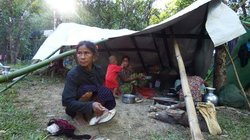 With Myanmar officials considering calling Rohingya “foreign citizen”, the persecuted people are demanding full citizenship, ethnic rights, and international protection before repatriation.
With Myanmar officials considering calling Rohingya “foreign citizen”, the persecuted people are demanding full citizenship, ethnic rights, and international protection before repatriation. RNA - Myint Thu, Myanmar’s foreign affairs permanent secretary, said at a meeting with Rohingya refugees in Cox’s Bazar, Bangladesh, that Myanmar’s government will consider the Rohingya “foreign nationals”, local daily The Daily Star reported on Monday, Anadolu news agency reported.
Clarifying Myanmar’s stance on Rohingya repartition, Myint Thu stated there are three types of citizenship in the 1982 Myanmar Citizenship Act, and whoever has been living in Myanmar for three generations would be entitled to get “naturalized citizenship”.
Even if the Rohingya are not direct Myanmar citizens, they will be allowed to live legally in Myanmar as foreign citizens according to clause three of the citizenship act, the report added.
But a Rohingya delegation meeting with Myanmar officials voiced opposition to the proposal.
Rohingya delegation leader Mohibullah announced that the Myanmar delegation had come up with the same old proposals and not a single Rohingya would return to Myanmar if they are not guaranteed citizenship.
Nay San Lwin, campaign coordinator of rights group Free Rohingya Coalition, described to Anadolu Agency Myanmar’s stance on citizenship and their demands before repatriation.
There used to be two types of identity cards: one for citizens, and another for foreigners. Until 1982, Rohingya held the former, he said.
“The offer made by Myanmar's Foreign Secretary U Myint Thu is completely unacceptable. Rohingya will never compromise to accept naturalized citizenship. Rohingya people are an indigenous ethnic group belonging to [Myanmar’s] Arakan state. Making us foreigners by offering naturalized citizenship means erasing our existence and history,” he added.
“Myanmar must stop making up stories,” he said, noting, “What we demand is full citizenship, ethnic rights, and international protection.”
Mohammad Abul Kalam, Bangladesh's refugee relief and repatriation commissioner, told Anadolu Agency that Rohingya representatives made detailed demands to Myanmar officials to facilitate the repatriation process.
“We, from our side, are providing all possible support to make repatriation happen. We [Bangladesh] want the repatriation to start, and it’s important from all the parties and stockholders included in the Rohingya crisis,” he explained.
Bangladesh’s Foreign Ministry will discuss any issues of citizenship of displaced Rohingya refugees with Myanmar if necessary, he stated.
Khin Maung, a Rohingya youth who is residing in the refugee camp in Cox’s Bazar with his 8-member family, told Anadolu Agency on Monday they will only return to Myanmar after getting full citizenship and assurance including from Myanmar and international community.
“They [Myanmar regime] burned our house, took our land, killed us and raped our women and daughters. And now they deny providing us with citizenship rights prior to the repatriation. How can we return to the lands where we are persecuted without having proper protection?” he said.
Protesting Myint Thu’s statement, Maung added, “We don’t have faith on our government [Myanmar], and we will never return as neutralized citizens there in Rakhine state.”
In the meantime, Bangladeshi Foreign Minister AK Abdul Momen on Monday stated that the Rohingya citizenship issue is an internal affair of Myanmar.
“Our focus is on their (Rohingya) dignified and safe return …. We don’t have any issue regarding their citizenship there,” Bangladesh state-run news agency quoted him as saying.
The Rohingya, described by the UN as the world's most persecuted people, have faced heightened fears of attack since dozens were killed in communal violence in 2012.
According to Amnesty International, more than 750,000 Rohingya refugees, mostly women and children, have fled Myanmar and crossed into Bangladesh after Myanmar forces launched a crackdown on the minority Muslim community in August 2017, pushing the number of persecuted people in Bangladesh above 1.2 million.
Since August 2017, nearly 24,000 Rohingya Muslims have been killed by Myanmar’s state forces, according to a report by the Ontario International Development Agency (OIDA).
More than 34,000 Rohingya were also thrown into fires, while over 114,000 others were beaten, said the OIDA report, titled "Forced Migration of Rohingya: The Untold Experience".
Some 18,000 Rohingya women and girls were raped by Myanmar’s army and police and over 115,000 Rohingya homes were burned down and 113,000 others vandalized, it added.
847/940